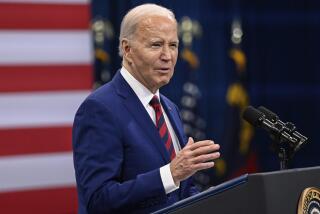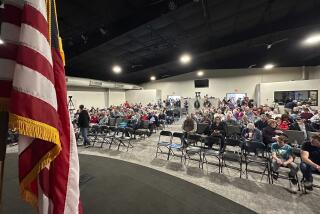Dukakis Tops Rivals in Kansas Caucuses : Jackson Takes Strong Second and Gore Third as Gephardt Trails
- Share via
Massachusetts Gov. Michael S. Dukakis won the Kansas Democratic caucuses Saturday, and the Rev. Jesse Jackson finished a strong second.
With 115 of the Kansas caucuses reporting, Dukakis had the support of 278 delegates to the state’s regional conventions, Jackson had 235 and Tennessee Sen. Albert Gore Jr. had 125. Trailing was Missouri Rep. Richard A. Gephardt with 12 delegates, while Illinois Sen. Paul Simon had none. Another 114 delegates were uncommitted.
Those totals broke down to 36% for Dukakis, 31% for Jackson, 16% for Gore and 2% for Gephardt, with 15% uncommitted. Most of the state’s 39 delegates to the Democratic National Convention in July will be officially chosen at regional conventions on April 23.
No Democrats turned out in Greeley and Wichita counties in far western Kansas, reducing the number of caucus sites from 117 to 115 and the number of local delegates elected from 768 to 764.
‘A Major Victory’
“It’s terrific,” Dukakis said of the Kansas results as he attended a Democratic Party fund-raising dinner in Detroit. “We’ve had a major victory in Kansas and feel good about it.”
The Massachusetts governor, when asked about the significance of winning in Kansas, said: “I think it’s the first farm and agriculture state that I’ve won and won decisively. I think that’s a very good sign for the future.”
Dukakis is expected to pick up 16 of the 39 national delegates at stake in Kansas. Added to the six delegates he gained earlier in the night in South Dakota, Dukakis maintained his Democratic lead in the delegate race with 503.5, according to the Associated Press survey.
Jackson should garner 14 delegates in Kansas for a total of 483.5 and Gore five delegates for 362.8, according to the survey. Four of Kansas’ delegates were uncommitted, raising the national total to 276.
A total of 2,082 delegates are needed to nominate.
Gore, who also was campaigning in Michigan, said the Kansas caucuses “looks like . . . a contest that’s going to be divided up between the three front-runners.”
Gephardt, who captured nine delegates in South Dakota for a total of 154, said he was not really concerned about Kansas and that his campaign’s focus has been on Michigan.
“I’m concerned about doing well in Michigan, and I think we will,” said Gephardt, who also spoke at the Detroit dinner.
Simon, who has 171.5 delegates, said before the start of the Jefferson-Jackson dinner in Detroit that he expected the party to have to go through a bitter convention fight to select its nominee.
“I’m just saying that’s a reality,” Simon said. Even the current front-runner, Dukakis, would have to win about 80% of the remaining delegates to wrap up the nomination on the first ballot, he said, adding: “That just isn’t going to happen.”
Dukakis, Gore and Jackson all made modest campaigning efforts in Kansas. Dukakis, who had been organized in Kansas longer than any of the other contenders, had been expected to do well.
S. Dakota Delegates
In South Dakota, meanwhile, which has 15 national delegates at stake, Democrats on Saturday honored the results of the Feb. 23 primary as they allocated their delegates.
Gephardt, who received 44% of the primary vote, will receive nine pledged delegates. Dukakis, who got 31% of the vote, gets the other six delegates.
In Texas, county Democratic conventions were under way Saturday as part of the process of allocating at-large delegates to the national convention. Texas Democrats use a peculiar, two-track system of picking national delegates. The results of the March 8 primary decided the distribution of 119 delegates, while 64 additional at-large delegates were allocated through a separate process of caucuses and conventions.
In early results, Dukakis, who finished first in Texas in the Super Tuesday primary, and Jackson, who finished second, were making the strongest showings. The contests were to pick delegates to the state convention in June, where the 64 at-large delegates will actually be chosen.
With 2,505 of the 5,288 county delegates accounted for, Jackson had 1,028, Dukakis had 895 and 276 were uncommitted. Other candidates receiving delegates were Gore with 235, Gephardt with 57 and Simon with 14.
Predict Similar Results
State party officials earlier had predicted that the final results would closely follow those of the state primary, in which Dukakis won 43 national delegates, Jackson won 42, Gore won 25 and Gephardt won nine.
“Nobody is going to break out. The candidates will probably get something that approximates the popular vote on primary night,” state Democratic Party Chairman Bob Slagle said.
For the candidates themselves, however, the focus Saturday was on Michigan, where Democrats hold caucuses next Saturday to allocate 138 delegates.
All of the major Democratic candidates except Jackson, who was fund-raising in Los Angeles, gathered for the party’s dinner in Detroit.
A poll published in today’s editions of the Detroit News showed Dukakis with the support of 33% of people who said they expected to vote in the caucuses. Jackson received 31% and Gephardt was a distant third with 10%. The survey had a margin of error of 5 percentage points.
More to Read
Sign up for Essential California
The most important California stories and recommendations in your inbox every morning.
You may occasionally receive promotional content from the Los Angeles Times.













